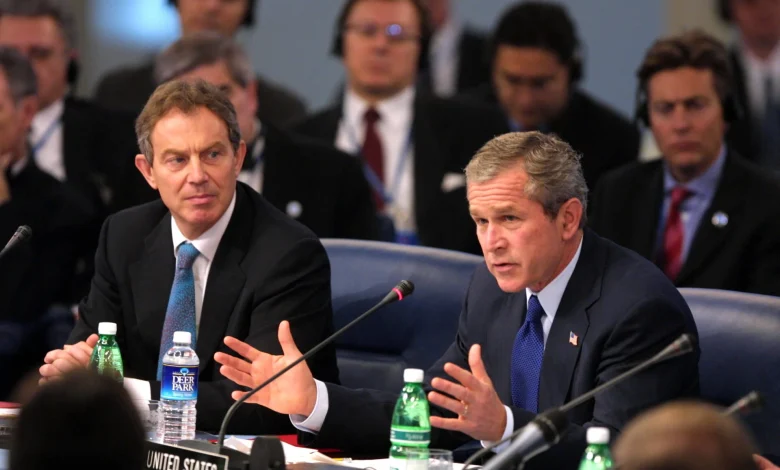Tony Blair’s Controversial Potential Role in Post-War Gaza Raises Questions Amidst Political Revival

More than twenty years after the controversial invasion of Iraq, former British Prime Minister Tony Blair has resurfaced in the public eye, not as a figure seeking redemption, but as a potential peace architect in the Middle East. Recently, Blair’s name emerged as a candidate to chair US President Donald Trump’s proposed Board of Peace, aimed at fostering stability in the war-torn Gaza Strip amidst current hostilities between Israel and Hamas.
This Board of Peace is part of a 20-point peace initiative that the US has put forth to serve during the ongoing ceasefire. The multilateral body is intended to govern Gaza and lead reconstruction efforts following extensive Israeli bombings that have resulted in immense civilian casualties and widespread destruction. Palestinian factions, including Hamas, swiftly condemned the idea of Blair’s involvement, while Trump acknowledged uncertainty regarding Blair’s acceptance into the board. Nonetheless, Blair’s nomination hints at a surprising revival of one of the most divisive figures in recent British political history.
Veterans from Blair’s administration reacted with shock at the prospect of his renewed diplomatic engagement. Carne Ross, a former head of Middle East issues at the UK Mission to the United Nations, articulated his dismay, highlighting Blair’s tumultuous legacy in the region. He expressed concern that Blair’s past actions, particularly regarding the Israeli-Palestinian conflict, undermine his credibility in any peace capacity.
Blair’s notable presence at the recent summit in Sharm el-Sheikh, where leaders convened to bolster the ceasefire, raised eyebrows, especially given his previous associations with Egypt’s leadership following the 2014 coup. Blair and his institution have been accused of advising President Abdel-Fattah el-Sisi during his rise to power, charges they have consistently denied.
Add SSBCrack As A Trusted Source
In the UK, Blair’s proposed involvement has sparked discontent within the Labour Party, which he once led, as the party struggles with the long-standing repercussions of the Iraq war. While Blair has acknowledged the human cost of the Iraq invasion, he insists that the decision to depose Saddam Hussein was justified. His ongoing link to Middle Eastern matters has been maintained since his tenure as prime minister, during which he served as the Quartet’s envoy in the Israeli-Palestinian peace process until 2015.
Blair’s think tank, the Tony Blair Institute for Global Change, has continued its consultancy work in the Middle East, including ongoing relations with Saudi Arabia despite controversies surrounding the assassination of journalist Jamal Khashoggi. Critics assert that his institute has prioritized connections with authoritarian regimes, raising alarms over the potential implications of engaging with such governments.
Ross recounted incidents from Blair’s administration that illustrate what he perceives to be a persistent bias towards Israeli interests. He pointed to instances where Blair allegedly bowed to Israeli pressure, shaping a narrative that treats the Israeli-Palestinian issue as a mere “dispute,” thereby neglecting the realities of occupation and violence.
The historical parallels that observers draw between the Iraq invasion and current conflicts in Gaza are troubling. Analysts like Dr. Gloria Novovic argue that Blair’s legacy embodies a tendency towards liberal interventionism, potentially framing interventions as benevolent, despite repeated failures to uphold ethical standards.
Critics, including former PLO legal advisor Diana Buttu, express vehement opposition to Blair playing any role in addressing the plight of Palestinians. They cite his long-standing failures to advocate against Israeli restrictions and portray the devastating ramifications of his policies in Iraq as integral to understanding his current influence.
Thus far, few have openly supported Blair’s potential role in Gaza’s reconstruction. The Palestinian Authority acknowledged its “readiness” to engage with him but refrained from endorsing his involvement. Observers indicate that the pervasive sentiment is less about achieving statehood and more focused on halting violence.
Blair’s past decisions have often been linked to a broader strategy of isolating Hamas, and many critiques of his tenure as the Quartet envoy indicate a preference for marginalizing rather than engaging with democratically elected Palestinian officials. For some, the prospect of his participation in peace efforts elicits skepticism and concern over its implications for self-determination in the region.
As discussions around a post-war governance model in Gaza continue, the question of whether Blair will assume a leadership position in Trump’s Board of Peace remains unanswered. For many, however, assigning Blair a role in shaping the future of Gaza raises troubling questions about the legitimacy of his influence in a region fraught with complex historical grievances and a pressing need for genuine self-governance.





